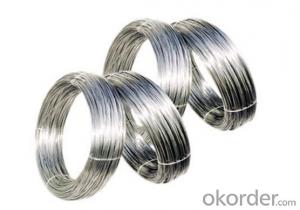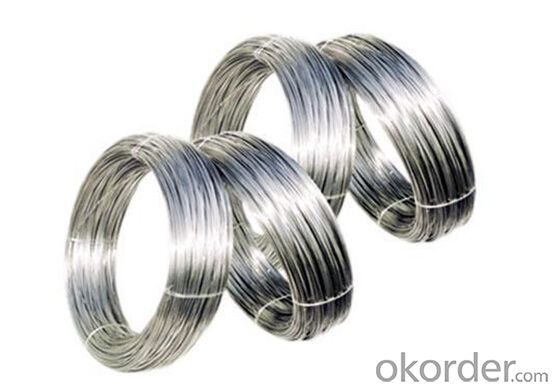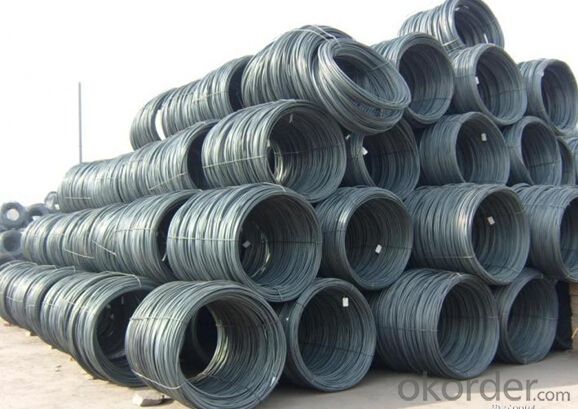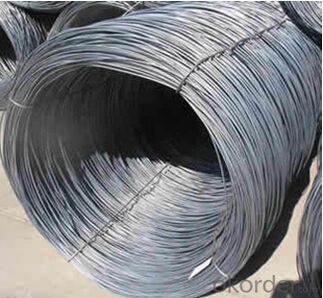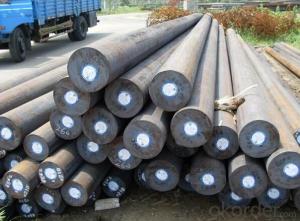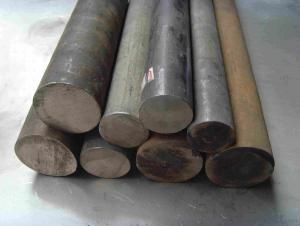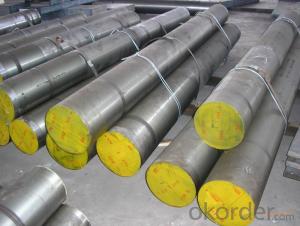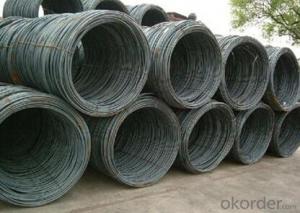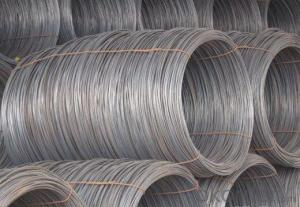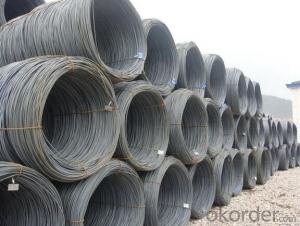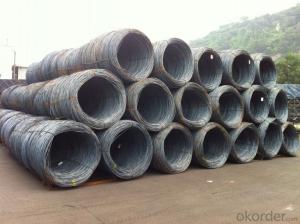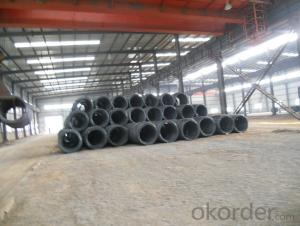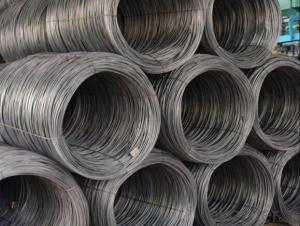Grade SAE 1006 Hot Rolled Steel Wire Rod in Coils
- Loading Port:
- Tianjin
- Payment Terms:
- TT OR LC
- Min Order Qty:
- 3 m.t.
- Supply Capability:
- 10000 m.t./month
OKorder Service Pledge
Quality Product, Order Online Tracking, Timely Delivery
OKorder Financial Service
Credit Rating, Credit Services, Credit Purchasing
You Might Also Like
Specification
Type:
Carbon Steel,Spring Steel,Bearing Steel,Gear Steel,Deformed Steel,Stainless Steel,Alloy Steel
Shape:
Steel Coil,Steel Sheet,Steel Wire Rod,Steel Flat Bar,Steel Square Bar,Steel Angle,Steel Round Bar,Steel Billets
Technique:
Hot Rolled,Cold Rolled,Cold Drawn,ERW,Forged,Saw,Extruded,EFW,Spring
Surface Treatment:
Galvanized,Coated,Copper Coated,Color Coated,Oiled,Dry,Chromed Passivation,Polished,Bright,Black,PVDF Coated
Certification:
ISO,SGS,BV,IBR,RoHS,CE,API,BSI,UL
Thickness:
5.5-12mm
Width:
5.5-12mm
Length:
in coils
Outer Diameter:
5.5-12mm
Net Weight:
2m.t.
Packaging:
seaworthy packaging
Grade SAE 1006 Hot Rolled Steel Wire Rod in Coils
Detailed Information of the Grade SAE 1006 Hot Rolled Steel Wire Rod in Coils
| Name | Hot Rolled High Carbon Wire Rod |
| Shape | Round Bar/Square Bar/Flat Bar/Plate/Wire |
| Standard | GB/ASTM/SAE/AISI/DIN/JIS/EN/BS |
| Surface Treatment: | Black/Peeling/Polished/Machined |
| Delivery Condition: | Hot Rolled or Forged/Peeled or Black Surface |
| Test | SGS/UT 100% Elements Testing |
| Certificate: | ISO/Mill Certificate |
| Service: | 24 hours online service / |
| more than 20 years trading and manufacture | |
| Quality Assurance: | the third party inspection, such as SGS, BV, TUV…etc. is acceptable |
| Packaging Details: | Seaworthy Packaging or as per customer's packing instruction |
Chemical Composition of the Grade SAE 1006 Hot Rolled Steel Wire Rod in Coils
| Grade | Chemical Composition(%) | |||||
| C | Mn | Si | S | P | B | |
| SAE1006B | 0.03~O.07 | ≤0.32 | ≤0.30 | ≤0.045 | ≤0.040 | >0.0008 |
| Mechanical properties | ||||||
| Yield strength(N/mm2) | Tensile strength(N/mm2) | Elongation(%) | ||||
| 250-280 | 350-380 | ≥32 | ||||
Company Introduction the Grade SAE 1006 Hot Rolled Steel Wire Rod in Coils
CNBM International Corporation is the most import and export platform of CNBM group(China National Building Material Group Corporation) ,which is a state-owned enterprise, ranked in 270th of Fortune Global 500 in 2015.
With its advantages, CNBM International are mainly concentrate on Cement, Glass, Iron and Steel, Ceramics industries and devotes herself for supplying high quality series of refractories as well as technical consultancies and logistics solution.
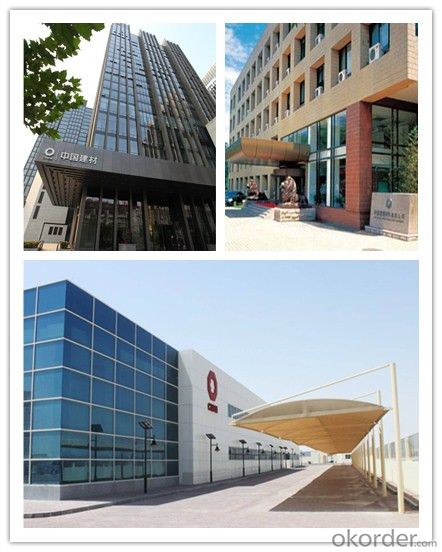
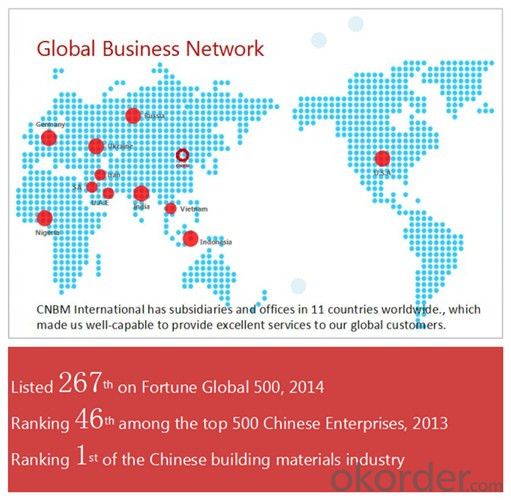
| After-sale service | CNBM provides the services and support you need for every step of our cooperation. We’re the business partners you can trust; you can relax and get on with doing business. |
| For any problem, please kindly contact us at any your convenient time, we’ll reply you in our first priority within 24 hours | |
| Advantages | Industry experience over 20 years. |
| Shipment of goods -More than 70 countries worldwide. | |
| The most convenient transport and prompt delivery. | |
| Competitive price with best service. | |
| High technical production line with top quality products. | |
| High reputation based on best quality products. |
Packaging & Delivery the Grade SAE 1006 Hot Rolled Steel Wire Rod in Coils
| Packaging Detail | Sea worthy packing /as per customer's packing instruction |
| Delivery Detail | 15 ~ 40 days after receiving the deposit |
Products Show
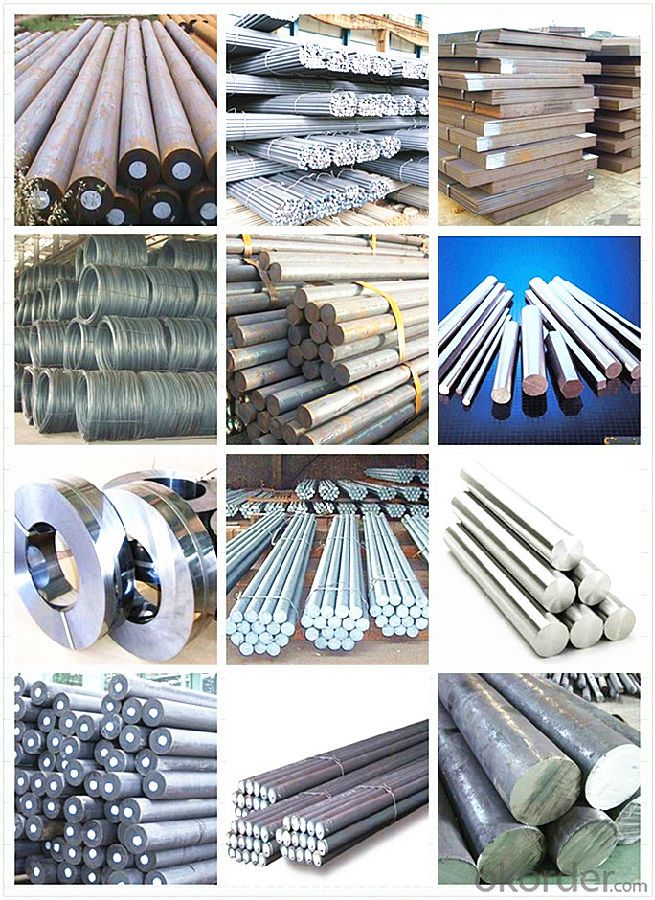
FAQ:
| Are you a trader or manufacturer? | Manufacturer |
| What’s the MOQ? | 3 metric ton |
| What’s your delivery time? | 15-35 days after downpayment received |
| Do you Accept OEM service? | Yes |
| what’s your delivery terms? | FOB/CFR/CIF |
| What's the Payment Terms? | 30% as deposit,70% before shipment by T/T |
| Western Union acceptable for small amount. | |
| L/C acceptable for large amount. | |
| Scrow ,Paybal,Alipay are also ok | |
| Why choose us? | Chose happens because of quality, then price, We can give you both. |
| Additionally, we can also offer professional products inquiry, products knowledge train (for agents), smooth goods delivery, excellent customer solution proposals. | |
| What's your available port of Shipment? | Main Port, China |
| What’s your featured services? | Our service formula: good quality+ good price+ good service=customer's trust |
| Where are your Market? | Covering more than 160 countries in the world |
- Q: How are nickel-based alloys used in the aerospace industry?
- Nickel-based alloys are extensively used in the aerospace industry due to their superior strength, high temperature resistance, and excellent corrosion resistance properties. These alloys are commonly employed in the construction of aircraft engines, turbine blades, and exhaust systems. They help improve engine efficiency, enhance fuel economy, and ensure safe and reliable operations in extreme conditions, making them crucial for the advancement of aerospace technology.
- Q: Are there any international standards for special steel?
- Yes, there are international standards for special steel. The most widely recognized and accepted international standards for special steel are set by the International Organization for Standardization (ISO). ISO develops and publishes a range of standards that cover various aspects of special steel, including composition, properties, testing methods, and quality requirements. These standards ensure that special steel produced by different manufacturers from different countries meet the same minimum quality and performance criteria. In addition to ISO, there are also other organizations and standards bodies that have their own specific standards for special steel, such as the American Society for Testing and Materials (ASTM) and the European Committee for Iron and Steel Standardization (ECISS). These international standards provide a common framework for the production, trade, and use of special steel across different countries and industries, promoting consistency, reliability, and quality assurance.
- Q: What are the main applications of special steel in the food processing machinery?
- Special steel is widely used in food processing machinery due to its exceptional properties such as corrosion resistance, high strength, and hygiene. Some of the main applications of special steel in this industry include manufacturing blades for cutting and slicing, forming dies for shaping food products, conveyor belts and chains, as well as various components like shafts, gears, and valves. Its use ensures optimal performance, durability, and compliance with stringent food safety standards.
- Q: What are the challenges in machining high-speed special steel?
- Machining high-speed special steel poses several challenges due to its unique properties and characteristics. One of the main challenges is its extreme hardness, which makes it difficult to cut and shape. High-speed special steel typically has a high carbon content and is heat-treated to enhance its hardness, which results in increased wear on cutting tools. The high hardness of this steel also leads to increased heat generation during machining, which can cause thermal distortion and affect the dimensional accuracy of the finished product. This requires the use of specialized cooling techniques and cutting tools with advanced coatings to dissipate heat and maintain stability. Another challenge is the brittleness of high-speed special steel. It tends to have low toughness and is prone to cracking and chipping during machining operations. This requires careful selection of cutting parameters, such as cutting speed, feed rate, and depth of cut, to prevent excessive stress and minimize the risk of tool failure. Additionally, high-speed special steel often contains alloying elements like tungsten, vanadium, and cobalt, which can further complicate the machining process. These elements increase the strength and wear resistance of the steel but also make it more challenging to machine. Specialized tool materials and cutting strategies are required to effectively machine these alloys and achieve desired surface finishes. Furthermore, the cost of high-speed special steel can be significantly higher than conventional steels, which adds to the challenges of machining. The high tooling costs associated with cutting tools necessary to machine this steel can be a significant investment. Overall, machining high-speed special steel requires advanced cutting techniques, specialized tooling, and careful consideration of cutting parameters to overcome the challenges posed by its extreme hardness, brittleness, and alloying elements.
- Q: How does special steel contribute to the manufacturing of industrial machinery?
- Special steel contributes to the manufacturing of industrial machinery by providing enhanced strength, durability, and resistance to wear and corrosion. It allows for the production of components that can withstand high temperatures, heavy loads, and harsh operating conditions. The unique properties of special steel enable the creation of precision parts, gears, bearings, and tools that are crucial for the efficient and reliable functioning of industrial machinery.
- Q: What are the different manufacturing processes used for special steel?
- There are several manufacturing processes used for special steel, including casting, forging, rolling, and heat treatment. Casting involves melting and pouring steel into molds to create complex shapes. Forging involves shaping steel by applying pressure and heat to deform it into desired forms. Rolling is a process where steel is passed through a series of rollers to reduce its thickness and shape it into sheets or bars. Lastly, heat treatment is used to alter the properties of steel by subjecting it to controlled heating and cooling processes.
- Q: How does special steel resist thermal fatigue?
- Special steel resists thermal fatigue due to its unique composition and structure. It is designed to have excellent thermal conductivity, allowing it to quickly dissipate heat and prevent the formation of thermal gradients within the material. This reduces the likelihood of cracking, deformation, or failure when exposed to rapid and repeated temperature fluctuations. Additionally, special steel undergoes specific heat treatment processes that enhance its resistance to thermal fatigue by improving its strength, toughness, and ability to withstand thermal shocks.
- Q: Can special steel be used in the agricultural industry?
- Yes, special steel can be used in the agricultural industry. It offers various benefits such as high strength, durability, corrosion resistance, and the ability to withstand harsh environmental conditions. It can be used for manufacturing agricultural machinery and equipment like tractors, plows, harvesters, and irrigation systems, improving efficiency and productivity in the agricultural sector.
- Q: What is the tensile strength of special steel?
- The tensile strength of special steel can vary depending on its specific composition and manufacturing process. However, special steel is generally known for its high tensile strength, often exceeding 1000 MPa (mega pascals), making it suitable for applications requiring strong and durable materials.
- Q: Can special steel be used for medical implants?
- Yes, special steel can be used for medical implants. Certain types of stainless steel, such as 316L, are commonly utilized in the manufacturing of medical implants due to their excellent biocompatibility, corrosion resistance, and mechanical properties.
Send your message to us
Grade SAE 1006 Hot Rolled Steel Wire Rod in Coils
- Loading Port:
- Tianjin
- Payment Terms:
- TT OR LC
- Min Order Qty:
- 3 m.t.
- Supply Capability:
- 10000 m.t./month
OKorder Service Pledge
Quality Product, Order Online Tracking, Timely Delivery
OKorder Financial Service
Credit Rating, Credit Services, Credit Purchasing
Similar products
Hot products
Hot Searches
Related keywords
